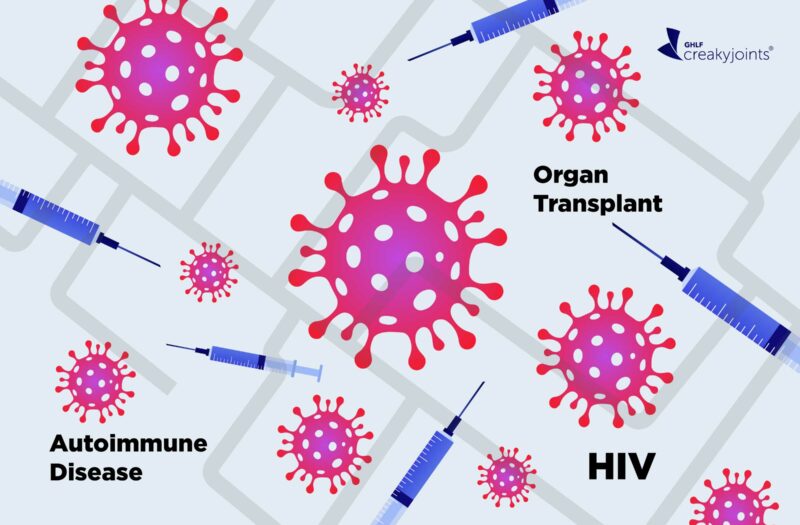Learn more about our FREE COVID-19 Patient Support Program for chronic illness patients and their loved ones.
Key Takeaways
- Vaccinated people with immune system dysfunction have a higher rate of breakthrough COVID-19 infections than people with healthy immune systems.
- However, severe outcomes from COVID in immunocompromised patients (including HIV, solid organ transplant, and rheumatoid arthritis) dropped significantly after vaccination than in the pre-vaccination period.
- Many immunocompromised people likely still need extra protection from COVID after they are vaccinated, including booster doses, masks, and medication to prevent and treat COVID infection.
Emerging research is now showing the risk immunocompromised patients face when it comes to breakthrough infections — but also how vaccination can reduce the chances of severe disease.
In a new JAMA Internal Medicine study of nearly 665,000 patients who received at least one dose of a COVID-19 vaccine, researchers found that those with immune dysfunction such as HIV infection, rheumatoid arthritis, and solid organ transplant had a higher rate of breakthrough infections and worse outcomes after full or partial vaccination than those without immune dysfunction.
Of the total patients studied, 35,512 (5.3 percent) had immune dysfunction.
More specifically, partially or fully vaccinated people with HIV infection had a 33 percent higher rate, those with rheumatoid arthritis had a 20 percent higher rate, and those with solid organ transplant had a 116 percent higher rate of breakthrough infection than those without immune dysfunction.
Overall, being fully vaccinated was associated with a 28 percent lower breakthrough infection risk compared to those only partially vaccinated. Older age and female sex were factors significantly associated with a higher chance of breakthrough infection.
The researchers analyzed data from the National COVID Cohort Collaborative (N3C), which provided a centralized electronic medical record-based repository of COVID-19 clinical data from academic medical centers throughout the United States. Those who had received at least one dose of the COVID-19 vaccine between December 10, 202 and September 16, 2021 were included.
The difference in breakthrough infection rate in people with immune dysfunction and those without it was more noticeable in the period after the Delta variant became dominant.
Researchers also believe Omicron will bring more breakthrough infections.
“We expect the breakthrough infection rates in people with and without immune dysfunction will increase in the era of Omicron,” says lead study author Jing Sun, MD, an epidemiologist and Assistant Scientist at Johns Hopkins Bloomberg School of Public Health. “Overall, our conclusion that people with immune dysfunction had a substantially higher risk and rates of breakthrough infection compared to people without immune dysfunction will be consistent, regardless of the strain of the virus.”
Patients with immune dysfunction had higher levels of disease severity, but also experienced a notable decline in severity with vaccination. Severe outcomes in immunocompromised individuals occurred in 3.3 percent of those with breakthrough cases compared to 6.3 percent of those in pre-vaccination periods. (Here’s more research showing vaccinated immunocompromised people are at higher risk for poor COVID-19 outcomes.)
The median time from full vaccination to breakthrough infection was 138 days (between four and five months). Overall, 1.2 percent of patients had a breakthrough infection within three months and 2.8 percent had one within six months after vaccination.
However, those with immune dysfunction conditions — particularly patients with HIV infections or recipients of solid organ transplant or bone marrow transplantation — experienced breakthrough infections much faster.
The findings support the use of alternative vaccine strategies (like additional doses) and nonpharmaceutical interventions (like mask wearing) even after full vaccination for people with immune dysfunction. Here’s more on the fourth COVID-19 “booster” dose in immunocompromised patients.
“We have ongoing projects that evaluate the impact of third doses or booster shots on COVID-19 breakthrough infection,” says Dr. Sun. “Immunogenicity studies and early data from Israel suggested booster vaccines could increase neutralizing antibodies and further reduce the risk of breakthrough infection and disease severity.”
Get Free Coronavirus Support for Chronic Illness Patients
Join the Global Healthy Living Foundation’s free COVID-19 Support Program for chronic illness patients and their families. We will be providing updated information, community support, and other resources tailored specifically to your health and safety.
Interview with Jing Sun, MD, an epidemiologist and Assistant Scientist at Johns Hopkins Bloomberg School of Public Health
Sun J, et al. Association Between Immune Dysfunction and COVID-19 Breakthrough Infection After SARS-CoV-2 Vaccination in the US. JAMA Internal Medicine. December 28, 2021. doi: https://www.doi.org/10.1001/jamainternmed.2021.7024.






